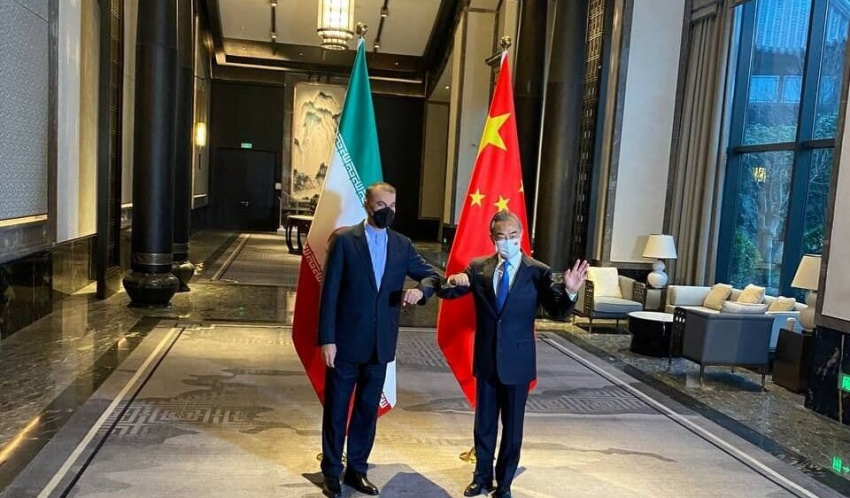Iran, China embark on a promising new horizon

The Iranian foreign minister ushered in such a horizon in an article published in Chinese media ahead of his visit. Amir Abdollahian said the visit “will be a promising new horizon for our promotion and development of cooperation in various domains.”
At the center of this horizon is a strategic comprehensive partnership plan between Iran and China signed last year. On March 27, 2021, then-Foreign Minister of Iran Mohammad Javad Zarif and Chinese State Councilor and Foreign Minister Wang Yi signed the plan, raising Tehran-Beijing relations in various fields to a new, strategic level.
The plan, officially known as the “Comprehensive Cooperation between the Islamic Republic of Iran and the People's Republic of China,” was extensively hailed by almost all Iranian officials as a “strategic” decision.
The plan, however, is yet to be fully implemented. In his op-ed for Global Times, Amir Abdollahian said the various cultural and political commonalities between Iran and China have paved the way for the two countries to pursue the development of economic and trade cooperation and implementation of the Comprehensive Cooperation Plan.
According to a separate report by Global Times, during his visit, Amir Abdollahian is set to discuss the implementation of a bilateral comprehensive cooperation pact among other topics of shared interest.
The early negotiations over the comprehensive partnership began in 2016 when Chinese President Xi Jinping paid a successful visit to Iran during which China and Iran announced the establishment of a comprehensive strategic partnership, according to Chinese Ambassador to Iran Chang Hua. Ever since, Chang told the Tehran Times last year, exchanges and cooperation in various fields between the two countries have become increasingly close.
The year 2016 was crucial for Iran-China relations that also posed some challenges to the path of developing economic and trade ties between the two countries. Iran had just concluded longtime negotiations with the P5+1 group of countries that resulted in the 2015 signing of a nuclear deal formally known as the Joint Comprehensive Plan of Action (JCPOA). Around the same year, the JCPOA was put to implementation. Iran’s vast economy was opened to foreign firms, including Chinese ones. European companies also flocked to Iran.
But with the election of Donald Trump to the U.S. presidency in November 2016, the inflow of foreign investments was heavily impacted. Trump unilaterally withdrew from the JCPOA on May 8, 2018, which led to European firms quitting Iran’s market altogether. Many Chinese firms, however, chose to stay. And that has played a pivotal role in laying the grounds for a deeper, longer-term partnership between Tehran and Beijing.
The election of a new president in Iran last year gave another boost to the bilateral consultations regarding the comprehensive plan. A few days after his inauguration in August last year, Iran’s new president, Ayatollah Seyed Ebrahim Raisi, spoke over the phone with Chinese President Xi Jinping.
In the call, Ayatollah Raisi described China's strategic plans, such as the “One Belt-One Road” initiative, in line with Iran's interests and said, “Full implementation of the Iran-China comprehensive cooperation plan should be on the agenda of all agencies of the two countries.”
The Chinese president, for his part, appreciated the development of ties with Iran, saying, “The relations between the two countries, especially after the agreement on the comprehensive plan for cooperation between Iran and China, have had remarkable results and achievements.”
President Xi said China is ready to strengthen cooperation with Iran in the One Belt-One Road initiative.
During his current visit to China, Amir Abdollahian carried a written message from President Raisi to his Chinese counterpart. In a meeting with Wang, the Iranian foreign minister described the message as “important.”
Upon his arrival at Wuxi Airport in China, Amir Abdollahian said by visiting China, he aims to hold talks with Chinese officials over bilateral political ties and also over ways of implementing agreements between the Islamic Republic and China over economic cooperation, according to the Iranian Foreign Ministry.
He headed to China at the head of a high-ranking political and economic delegation at the invitation of his Chinese counterpart and was scheduled to hold talks with China’s top diplomat over the latest state of the 25-year cooperation agreement between Tehran and Beijing.
Amir Abdollahian said the pace of cementing ties with China has increased under President Raisi. The foreign minister said he has held seven phone calls and meetings with Wang in the past four months. “This indicates the importance and development of ties between the two countries. And in the new government, we are witnessing the further acceleration of the [development of] ties,” Amir Abdollahian pointed out.
Source: Tehran Times

